 By Ray Rivers
By Ray Rivers
January 22, 2018
BURLINGTON, ON
It’s 8 am on a sunny Saturday morning and you’ve received a message on your phone, also blaring on radio and TV, that there is a missile of unknown origin coming your way and you need to seek immediate shelter. That is the kind of terror that people living in Hawaii recently experienced. That it was a mistake this time, a technical error, doesn’t make it any less gut wrenching. In fact that incident begs the question about our country’s readiness to face the unthinkable.
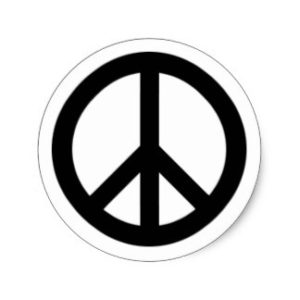 There is a no-brainer – ban the bomb – but that’s not going to happen because it’d have to be global. Singing Kumbaya from the universal planetary hymn book just won’t cut it, and neither will hope and prayer. But then who would want to do this to us? Canada has no international enemies, right, except maybe ISIS or the Taliban? We are otherwise at peace.
There is a no-brainer – ban the bomb – but that’s not going to happen because it’d have to be global. Singing Kumbaya from the universal planetary hymn book just won’t cut it, and neither will hope and prayer. But then who would want to do this to us? Canada has no international enemies, right, except maybe ISIS or the Taliban? We are otherwise at peace.
And if peace ain’t enough, there are some of those anti-missile defence systems. Shooting down your enemy’s missiles is almost as old an idea as the missiles themselves, going back to Germany’s V1s and V2s. The Russians now have more modern ABMs, so does Israel, China, India and the USA of course.
There used to be an international treaty banning the development of anti-ballistic missile systems (ABM). But then GW Bush tore it up and in the process empowered/emboldened one very paranoid former KGB agent by the name of Vladimir Putin. And the Russians responded by tearing up the treaty limiting multiple warheads (MIRV). MIRV missiles with ten to fifteen individually targeted warheads are real hard to find and get and the latest Russian technology makes these warheads even harder to take out.
All of this kind of talk takes us back to the cold war option of mutually-assured-destruction. Unless one can guarantee there are enough accurate ABMs to take out all the incoming nukes it’s back to the Doomsday scenarios, fallout and bomb-proof shelters, as they have retained and restored in Moscow.
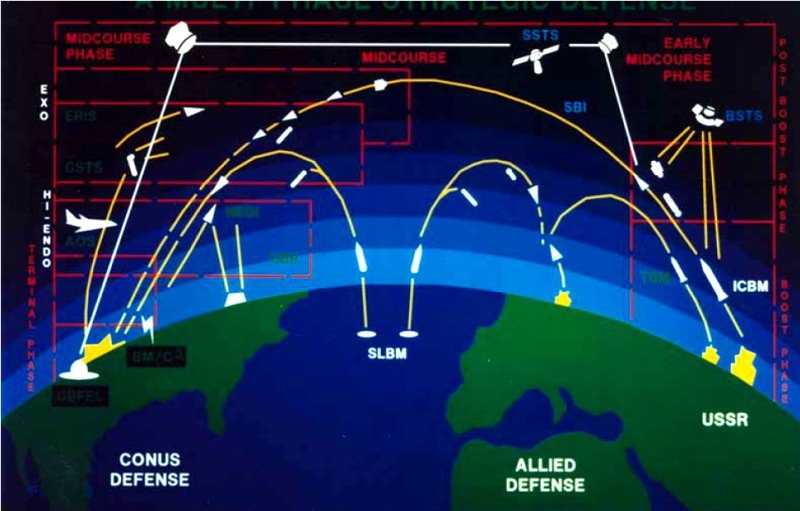
An illustration of how the Star Wars technology was going to save everyone.
Of course Ronald Reagan who was fond of Star Wars, got a lot of laughs, but back in 2005 Bush Junior tried to involve Canada in its military’s efforts at developing a fleet of North American ABMs. Despite years of testing and development and more money handed to the military-industrial complex than anyone can imagine, performance is still less than perfect. And perfect is what is needed if you are to prevent a multi-megaton nuclear missile from cleaning up your neighbourhood, giving new meaning to the term urban renewal.
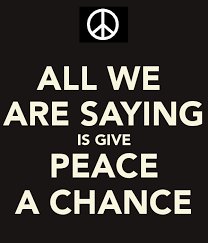 Periodic test failures provide little comfort that these systems with highfalutin names like THAAD and Aegis would actually do the job. We can tell by the near panic we hear from the man in the White House every time his favourite Rocket Man over there fires off one of his new toys. They certainly couldn’t stop North Korea’s launches over Japan with their ABMs. What makes anyone think these systems could really stop the big one should it ever be coming to a location near you?
Periodic test failures provide little comfort that these systems with highfalutin names like THAAD and Aegis would actually do the job. We can tell by the near panic we hear from the man in the White House every time his favourite Rocket Man over there fires off one of his new toys. They certainly couldn’t stop North Korea’s launches over Japan with their ABMs. What makes anyone think these systems could really stop the big one should it ever be coming to a location near you?
Paul Martin, clinging to power with a slim minority government and facing opposition from the Bloc and NDP, told Bush a big negatory back in 2015. Canada would not be in. And seriously, if there were four nuclear ICBMs headed to North America targeting Settle, San Francisco, Los Angeles and Vancouver – and a Canada/US missile defence system could only intercept three of them – which city would get the short straw?
But some issues never go away. Media folk, perhaps prompted by US defence contractors, raised the topic again last week as Canada co-hosted an international summit on North Korea’s nukes, out in our own la la land, Vancouver. The purpose was to discuss enforcing sanctions on Kim’s little ole’ republic ahead of any negotiations, or something like that. And being the gracious hosts we are, we handed over some chump change (~$3 million) to the cash-starved US to continue to monitor the Russians and Chinese as they breach the UN sanctions.
Of course the hermit dictatorship wasn’t invited and neither of its two influential neighbours China and Russia attended either. So neither of those nations were able to explain why they violate the very sanctions they committed to when they voted for them. There were also suggestions that this would demonstrate to the often belligerent US president that negotiations, rather than the bully-pulpit, or worse, might be more effective. But Trump couldn’t attend, perhaps needing to get some exercise and attend to his putter… or doctor.
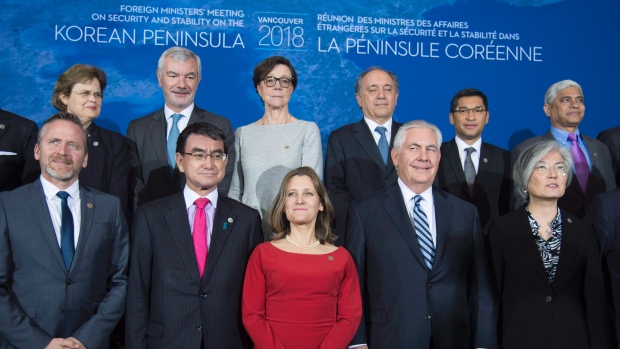
Thew people that mattered weren’t in the picture.
There were speeches by foreign ministers from some 20 countries apparently, but only Japan and the US really mattered and neither of those had anything new to add. I’m glad I didn’t attend, well actually I wasn’t invited. But had I been, I would rather have headed for a couple days of something more stimulating up at Whistler. Though at least Vancouver’s weather was a little warmer for a boondoggle than Ottawa’s or Burlington’s, but still too cold for those used to Mar-a-Lago.
But the good news was that this so-called summit had no sooner begun then it was upstaged by serious diplomatic events happening on the Korean peninsula. After a phone call and series of meetings North and South Korea have agreed on a joint athletics team for the 2018 winter games in Pyeong Chang (S. Korea) early next month. And they are talking about other stuff too – so who knows maybe they’ll be restarting peace talks? We’ve seen this movie before but perhaps the ending will be different this time.
Of course Trump is taking credit for this new dialogue, and it is not inconceivable that his fire and fury may have actually helped. But the peace prize, if there is one, will have to go to South Korea’s recently elected pacifist president Moon Jae-In – who came into office promising dialogue. And if that means Kim will ultimately be retiring his nukes, then we here, next door to his real nemesis, will be able to sleep soundly again. And that might put to rest any talk of rushing to pour real Canadian cash into an American ABM system, which has yet to prove its reliability.
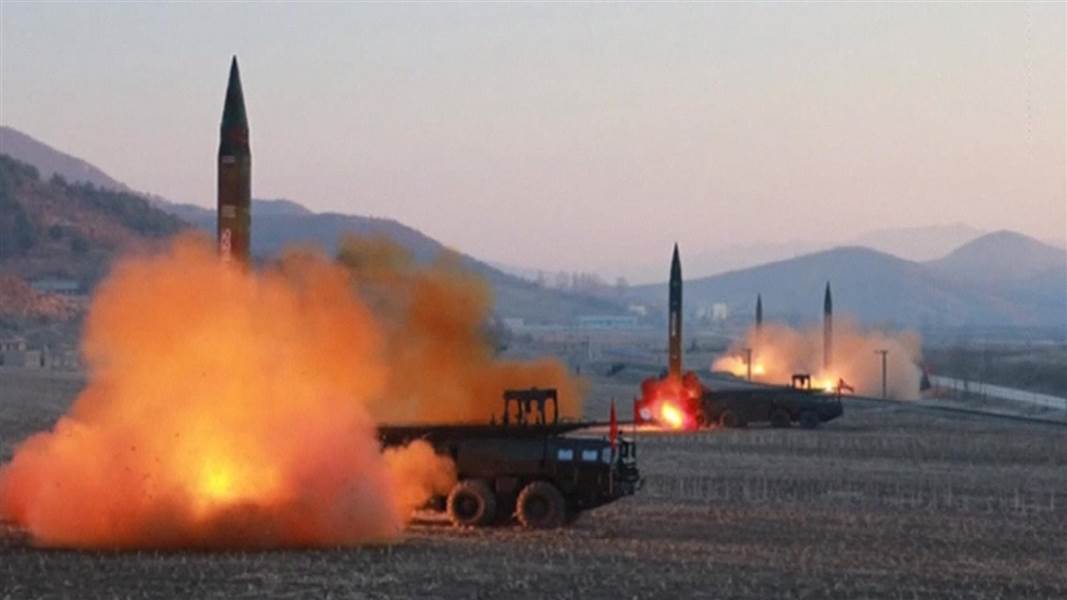
The missiles are tested and shipped to almost anyone who can pay for them.
Fellow NATO partners Turkey and Greece have recently purchased Russian-made S series anti-missile/aircraft systems. France has developed its own system. And we in Canada have a defence co-operation treaty and a free trade agreement with Ukraine, which had built many of the former Soviet systems, including those massive SS-24 nukes with 10 warheads, back in the day. Under attack from its more technically advanced neighbour now, this eastern European nation is actively seeking partners to help fast track development of its former missile and missile defence industries.
Perhaps we need to be looking longer and further afield if a missile defence system becomes a priority for this country and peace is no longer the answer. After all, there is merit in that the old adage that good fences make better neighbours. Just ask the Ukrainians.
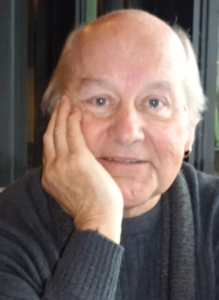 Ray Rivers writes weekly on both federal and provincial politics, applying his more than 25 years as a federal bureaucrat to his thinking. Rivers was once a candidate for provincial office in Burlington. He was the founder of the Burlington citizen committee on sustainability at a time when climate warming was a hotly debated subject. Tweet @rayzrivers
Ray Rivers writes weekly on both federal and provincial politics, applying his more than 25 years as a federal bureaucrat to his thinking. Rivers was once a candidate for provincial office in Burlington. He was the founder of the Burlington citizen committee on sustainability at a time when climate warming was a hotly debated subject. Tweet @rayzrivers
Background links:
Hawaii Missile Alert – Canada and US ABM – More Canada ABM – Nightmare Scenario – Joint Attack Preparation – NK Summit – ABM Tech – Korea Talks – Vancouver Summit – Olympics – Vancouver Summit –
Canada Contributes – American ABMs – American ABMs Failures –



















Well done. As some readers know, I served in a Strategic Air Command Nuclear ICBM Wing in the 1960’s. Even then a launch was viewed as an act of either suicide or last ditch mutual destruction. Unless launched from submarines, the time between launch and strike ensured the other side would launch in retaliation, even if only as a last gasp. Thus, the greater risk (discussed internally) was a madman in control of the launch protocol. With the possible exception of Trump, no such madman is in such a position, even in North Korea. Portraying Kim as such is a dangerous distraction; and, it is highly likely the American Joint Chiefs of Staff would bundle Trump into a golf bag for a trip to the caddy shack.
Nonetheless, as G.W.Bush & Cheney so amply demonstrated, nothing raises money and reduces freedoms like a good dose of terror.
Timely column.
The Vancouver meeting was not a summit. Summits are confined to the leaders of countries.
While I too share the thought that bankruptingly costly anti-missile systems are probably not worth the coin, for all the reasons you cite, the question still remains — what should we do to protect ourselves as best we can from the armageddon of a thermonuclear war? Israel has built underground shelters for most of its population to shelter them from ordinary missile attacks. But Israel is a tiny country with a small population. I doubt with Canada’s geography and population anything like a national nuclear bomb shelter program would amount to much.
It is the role of the federal government to protect the population. All you hear coming from Ottawa is the sound of crickets chirping on this file. It would be nice if the government, that is here to help us remember, at the very least issued instructions to the public on how to deal, at a personal level, with a nuclear attack.